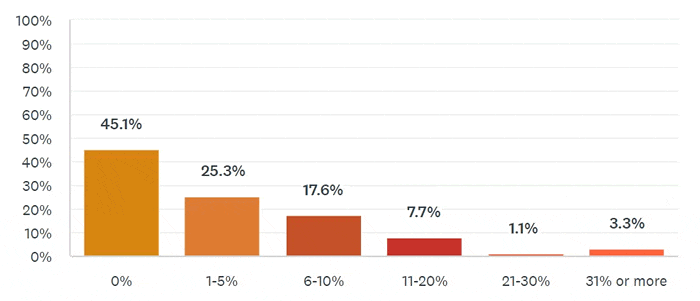According to the LANDTHINK Pulse results, 45.1% of our audience indicated that if they were buying rural land, they WOULD NOT be willing to pay over appraisal to win a bidding war. Land prices have always been negotiable. Usually, that has meant buyers playing hardball with sellers to push them below their asking price. But lately, with a low supply of land for sale, the opposite has been happening. In a supercharged land market like we’re experiencing, where there are multiple bids on a property, buyer demand can push the price beyond what an appraiser determines it is worth. Many buyers have been willing to go well above asking price and appraisal value to snag the land that meets their desires and suit their needs. With bidding wars more commonplace in many markets, like the Southeast, and an influx of cash-offers, in some parts of the country buyers don’t have much choice.
Last month, the LANDTHINK Pulse posed the following question to our audience: If you were buying land, how much would you be willing to pay over appraisal to win a bidding war?
November Pulse Sponsored by
To say the 2021 real estate market was competitive might be the understatement of the year — at least in many areas. White hot buyer demand from 2020 carried over into the new year, creating headaches for buyers and big profits for sellers. Ongoing fierce competition is prompting a growing number of would-be land buyers to pay more out of pocket to close.
A land appraisal is an impartial estimate of a property’s value that is given by a licensed appraiser. Appraisers work using historical data and their appraisal must be based on recent sales of comparable properties in your area. Appraising rural or remote properties can be a difficult, however. Often the appraiser will have to draw comps from a considerable distance and consider various intangibles. Also, in a hot market, appraisers often have a hard time keeping up with quickly increasing property values. When land is being financed by a bank, the lender typically requires an appraisal to make sure the estimated value of property matches the agreed-upon price. The buyer or buyer’s lender commonly orders the appraisal, and it is typically conducted by an appraiser of the lender’s choosing, and the buyer foots the bill.
Whether you are buying or selling land, appraisals exist for good reason. Just like a home, land can have hidden issues. The appraisal will take into account things like the current state of the land as well as the overall quality of the land. Appraisers look at things like location, access, topography, historical management practices and much more. An appraisal is designed to protect the buyer, as much as the lender, from paying too much on a parcel that doesn’t warrant its price tag.
Even without improvements, land isn’t cheap. Buying land is a complex investment, so it’s important to verify that the money you are spending is worth it and that the property is suitable for its intended use. There are a lot of different land types: residential lots, commercial, farmland, timberland, recreational land and more. There are even more variables that could be associated with each type of property.
When an appraisal comes back from the bank saying the property is worth less than the contract price, it’s called an appraisal gap, and it occurs in both rising and falling markets. For a would-be buyer, figuring out how to proceed is not simple. Negotiating an appraisal shortfall is where having an experienced buyer agent is extremely important. They can help you make some difficult decisions and arm you with the right information to help you make the decision that is right for you.
Options for overcoming a lower than expected appraisal include paying the difference or renegotiating with the seller. When you enter into a negotiation to purchase land, all parties want the transaction to be successful. Often, the seller will negotiate with you to keep the deal moving. If you don’t have a strong need in closing the deal, then walk away if there is an appraisal contingency. If you rethink the math and conclude that the appraisal gap is manageable and you feel good about the land you are buying, then keep moving forward toward closing. There is nothing wrong with a sales price that is higher than appraised value—as long as you go in with your eyes wide open. Often buying land is a quality of life and lifestyle decision, not just an investment. The land value could continue to go up, and you may find yourself in a similar situation if you decide to sell. If the land market cools and values decline, it could affect your bottom line later.
If you do pay over appraised value, you will need to bring the additional cash to the closing table to make up the difference between the sale price and the amount above what the bank is willing to lend. Even an experienced land agent may not be able to negotiate a lower sale price. In a hot seller’s market, another buyer is waiting.

The majority of the LANDTHINK audience (45.1%) indicated that they would not be willing to pay anything over appraised value to win a bidding war. Coming in second, 25.3% said they would pay 1-5% over appraisal. Only 17.6% indicated that they would pay 6-10% over appraisal, 7.7% said 11-20%, 3.3% said 31% or more, and just 1.1% said they would pay 21-30% over appraisal.
LANDTHINK would like to thank LANDFLIP for sponsoring the November Pulse and for choosing a very interesting question to pose to our audience. LANDFLIP helps buyers easily find land and provides land sellers with an easy to use platform for marketing and advertising land for sale, land auctions, land for lease, and land for sale by owner.
Become a Pulse sponsor! It’s a great way to ensure your brokerage is the first one buyers and sellers call when they have a need to buy or sell property. You’ll get insane exposure on Social + Email + Web. That’s 500,000+ monthly eyes on you! Once you have it, you won’t want to give it up! Pulse sponsorships are offered on a first come first served basis and are subject to certain limitations. If your business is interested in becoming a Pulse sponsor or you want to suggest a question for the Pulse, please contact us.
This content may not be used or reproduced in any manner whatsoever, in part or in whole, without written permission of LANDTHINK. Use of this content without permission is a violation of federal copyright law. The articles, posts, comments, opinions and information provided by LANDTHINK are for informational and research purposes only and DOES NOT substitute or coincide with the advice of an attorney, accountant, real estate broker or any other licensed real estate professional. LANDTHINK strongly advises visitors and readers to seek their own professional guidance and advice related to buying, investing in or selling real estate.











I am not surprised by this because of the competitiveness of todays land market you just don’t run by many “deals” anymore on the open market.
Land valuation for purchase by any buyer must be based on the gross and net sales coming from the land. Just study the books of the selling land operator and calculate the value of the land. How much mortgage will the net profit demonstrated recently on the land carry? How does that compare to the appraiser’s valuation? There is no point buying land for more money than it is worth; although you must acknowledge that ‘most’ sellers and all realtors will try to bait buyers into doing just that.
It all comes down to LOCATION LOCATION LOCATION!
Houses, apartments, land in hot markets get a lot of competition and often it goes into a bidding war. I know someone that just purchase house in NJ and paid 9% over asking price.
If you go to market that is not hot DO NOT expect anyone to bid over asking prices with many listings sitting on the market for months with no offers.
I find these articles helpful but the math in the above example seems to be wrong. Based on these numbers the majority of the Landthink audience WOULD pay over asking price — from 1-31% more or even higher. Add these folks up and it comes to 55%, which I believe is more than 45.1%. Crazy market regardless.
Like everything else, land prices are inflated. The market is what people are willing to pay. As long as people are able to pay the higher prices, the land prices will soar.